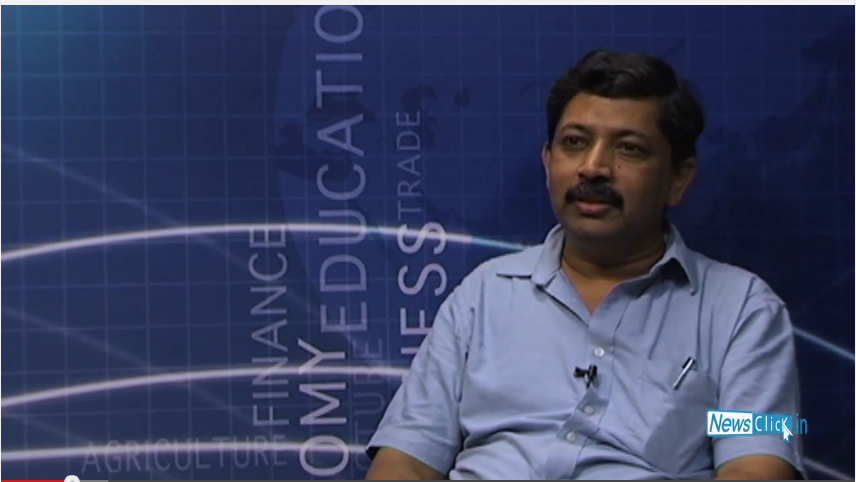Why a Big NO to FDI in Insurance?
Prof. Surajit Mazumdar of Jawaharlal Nehru University while talking to Newsclick, is allowing Indian savings to be go to foreign companies. The record of foreign companies, particularly in insurance, is one of aggressive wooing of customers, not paying them under various pretexts and using this money for speculative purposes. This is their “efficiency”, which the public sector insurance companies cannot match. Without regulation, these companies play in the market as American Insurance Group (AIG) did and get bailed out if their speculations fail. As we know, 49% is more than enough to control companies and therefore this method of handing over control of Indian peoples savings to foreign hands and financial liberalisation. This is dangerous for the Indian economy.

Rough Transcript:
Rishab Bailey (RB): Hello and welcome to Newsclick,one of the most controversial issues to be taken up in this session of parliament is that of raising the FDI cap in the insurance sector. This move is part of the series of the economic reforms promised by the Modi government and is seen as a way to increase the efficiencies in the insurance sector. However the move has run into trouble with congress refusing to support the move, as well as opposition from various left parties as well as trade unions. To discuss the matter, we have with us Dr. Surajit Mazumdar, professor of economics at JNU. Thanks for joining us today. Now to begin with why was the insurance sector opened up to FDI in 2000? What were the benefits that were supposed to accrue to the industry and to the country as a whole and what has happened in last 15 years?
Surajit Mzumdar (SM): I think a distinction needs to be made between, why that particular move was taken and what was set to be the benefits that would accrue from that. The main driving force behind that was to open up what was considered a lucrative business for private players. It was part of a process of opening up and liberalization of the financial sector where in a sector like insurance, any insurance is commands lasts quantums of financial resources and is able to operate in the plain market with those resources. So it is those interests which were mainly behind the opening up of the sector rather than any clear cut economic rationale. Particularly in the case of insurance, and as many which may not be similarly applicable to many other activities, there is a very strong case for a public sector monopoly which is what was created in India on the basis of nationalization in 56 and 73 of life and general insurance, so there is a very strong rationale . But the argument that was made however was, that the penetration of insurance in India is very low, private players will lead to an expansion of that sector, there will be an increase in an efficiency because of heightened competition. None of which is actually valid for the insurance sector. If we take for an example the case of competition, what is the insurance business? People pay a premium to an insurance company for transferring the burden of risk to that company. Everyone pays a premium, in case of any eventuality, the financial implications of that unfortunate eventuality will be borne by the insurance company. And the insurance companies basically operate on the principle, that the large number of people pay them the premium, not everyone will face eventuality but in the process they come to command large quantum of financial resources which they are able to deploy in various places and have return. Now, if that is the nature of that business surely you can not have a process where there is competition, where the insurance companies are going bust and bankrupt, then what happens to the risk? I mean if I pay an insurance premium today for an eventuality that might happen 20 years later, I am paying medical insurance from a certain age. I may fall ill 20 years later, in between if the insurance company goes bust because it had been driven out by competitor, then what happens to my security? The other thing is, as far as penetration is concerned, see if you want in India, the insurance sector to penetrate to a greater extent, what essentially is the position? In country like India, what is the barrier to the entry of many people into getting the benefits of insurances, that as their ability to pay a premium declines, the risk factor actually increase. So the people who are more vulnerable, have also lesser ability to pay premium. Now the private logic of insurance is greater is the risk, higher must be the premium. So as far as private logic is concerned, you can not have an extension of the insurance in India, or penetration through the private sector. Thats why the public sector becomes important. The public sector which is governed by different set of principles, could be a possible vehicle for greater penetration. However if you allow private players to take up more lucrative parts of the business, then you also limit the public sector insurance companies financial ability to extend the benefit to those who are more vulnerable but have lesser ability to pay because there is some kind of balancing that has to happen, that you get people whose risk may be lower but they pay higher premium and you take advantage of the financial strength that gives you to extend the benefit to those who are more vulnerable but are less ables. If you let private players to take away that part of business, then you limit limit the capacity, and even if you maintain a public sector insurance companies, their ability to extend benefit to other gets restricted . So therefore there is a rationale for actually maintaining a public sector monopoly. If you have a private monopoly then you have problems with it. A Public sector monopoly allow all this spooling process to happen. Those who need insurance can pay premium to that same insurance company, which is able to balance across the different interests and you don't have problem of that cut throat process of competition. So there always is a rationale from maintaining a public sector monopoly, and if you look at historical development of insurance sector in India, it has largely been based on the public sector. Even today, Both in life and general insurance , 70% of the business in life insurance is with LIC, 60% of the general insurance business is still with the public sector companies, so the private sector companies really have not been able to really replace the private sector because thats the nature of that particular activity.
RB: so you don't actually buy this argument about greater investment being made possible by in the areas like infrastructure , or having more foreign companies coming in will bring better practices being followed in industries, whether its timely payment and so on and so forth?
SM:- No, I don't buy these arguments and there are couple of reasons for that. Number one is, as far as insurance is concerned, unlike say a manufacturing activity, in a manufacturing activity, foreign firm makes a greenfield investment, it creates assets which it finances with the money it brings in. if it buys something in India, it requires assets which it finances with the money it brings in. in insurance, you are going to acquire command over a large quantum of finances resources not by bringing in anything proportionate to that. So the equity capital of an insurance company is like a bank. A banks main source of finances or the resources are the depositors not the shareholders. Same is with the insurance companies. It's the premium which is paid by the policy holders which is the main source of financial resources, all those resources which are generated within your country . When you allow more foreign penetration into that sector, you are placing that under control of foreign holders with what benefit? You don't have significant benefit in terms of augmenting domestic resources by foreign investment because the scale of that investment is too small in relation to the resources we command. Number two, in the other way in which FDI is suppose to bring some benefit is that it brings know how. Now, I am not able to understand this, that in a sector like insurance where the production of products or services is not like producing a sophisticated drug or sophisticated manufacturing process requiring large amount of investment and research and development. If that is something we are not capable of doing ourselves, what are we capable of doing? And since if we don't have that capability, then that should be an added reason for not allowing all these players in because you need that ability if you want to regulate that sector. Its not that sector that can exist without regulation. You can't have a complete free market in insurance. You have to have a regulation. So if you do not have the capacity within the country to understand what are the requirements of that sector then how are you going to regulate it? If you have that then you don't need foreign players for this activity. Secondly, as far as the foreign players are concerned, what is the historical experience? What is the evidence on basis of which one would say that they know this business very well. Is it the case that the benefits of insurance that... do we not know about how much difficulty people in United States in getting money out of the insurance companies when there is a medical problem and all of that. In this country without even a legal processes working as quickly as they made there what is likely to happen. Number two is do we not know the experience of what insurance companies have done with the money that they have put into the financial markets. We know the story of AIG. What has happened it has to be bailed out. What is the evidence on the basis of which one say that they know how to do these things and they are going to bring that know how to us. I don't think there is any real evidence on that basis. And if insurance is a business in which policy holder is essentially transferring the burden of risk you have to ensure that the use that is made of the money that is put together from the premiums is not in such a manner to place we increase the degree of risk. That's precisely the kind of behavior that one has seen. Now, given that the market will continue I presume to be heavily regulated, are these fears like an AIG like situation occurring in India is a little overstated. Are the negative impacts really likely to be so bad. You see, this AIG like situation so happened in a context there was a regulation. But there was also a story of a process of that regulatory framework changing over time and creating the possibility of an AIG like situation. There was a story of a regulatory failure. Now, in the Indian context, the question is that is this the end? No, this is only one step in a chain which is leading in the same direction. This is a part of the process of deregulation. That the restriction that existed you are reducing that restriction. Now, of course the argument is when 25 percent was allowed you said it will be only limited. Even today it is being said 49 percent we are increasing it to but control will remain in Indian hands. But if control is going to remain in Indian hands then what is the meaning of increasing 49 percentage in any case. It is part of actually a process where you are increasing the possibilities of that kind of a situation arising. So I don't think the existing scenario should be taken as the finals. I would look at this particular move as part of a process because of what is driving it. It is not an economic rationale, it is not in the interest of the customers, it is not really the interest of the economy which is driving this. If it is driven by interest which are seeking to acquire greater control over these financial resources in order to be able to play in financial markets with these, then this is not the end. More is likely to follow. So therefore, it is important to say no at this point and not just make an assessment based on precisely what is the situation today because this is an indicator of more things that unfold.
RB: Now, the BJP had of course opposed the increasing of caps in the FDI sector when they were in opposition the parliamentary committee headed by Yashwant Sinha had rejected this proposal. Of course, now they are pushing this move while congress which was pushing it previously is opposing it now. Why do you think this change in positions? Is it purely a political game?
SM: When anyone is in government then it is on them that the forces which are interested in this kind of deregulation have the greatest degree of influence. When you are not in government however, there is an objective reality. OK, you privative the insurance sector. But in some sense people have voted with their money when they still keep more of their money with LIC or the public sector General Insurance Companies than with private companies. They are much more vary about the output. So within society there is a sentiment that may be public sector is better and there should be restrictions on this. So when these parties are in opposition within employees in that sector also there are similar concerns. So when they are in opposition, they are little more prone to reflect that sentiment. But when they are going to government, then a different set of forces take over in shaping the actuals. What is common is that when in government they have taken the same approach.
RB: Absolutely, I think that is really an important point to note that essentially they follow the same economic strategy irrespective of which party is actually in power.
SM: Something that was being opposed is one of the first major decisions that you take after coming into the government.
RB: So, how do you think the situation will play out now? You have spoken about it essentially been like a thinner edge of the wedge. This is just one step in series of steps that might you know look to further privatize the sector. How do you see this actually being played out given the opposition that this move is facing Left parties are opposition as various other regional parties, trade unions and so on and so forth. I think if it is simply reliant on when parties are in opposition, they behave in one way and when they are in government, they behave in different way. If it is simply reliant on that because there is no genuine commitment to stopping this, reversing this on either of the sides. This process is likely to go on. I think, it will not be settled however by just this but at the large level of societies at different level of society when they act to what extent they are able to exert pressure on the government to amend the ways it is approaching. It's not going to happen only on the question of insurance but a whole series. It is a part of a larger policy framework which has proved itself over the last twenty years as capable of generating tremendous riches at one end but not been able to significantly to transform the lives of positive way of large sections of the Indian population. So that division has played itself has it played itself out. How it plays itself out in Society and Politics will of course shape what will eventually happen. I don't think simply Congress and BJP depending upon whether they are in government or opposition behaving differently that is all that is to it that I see this process will be going on.
RB: Well, let's hope we are not into such difficult times. Thank you Surajeet for joining us today. That's all the time we have in Newsclick today. Do join us again later.
Get the latest reports & analysis with people's perspective on Protests, movements & deep analytical videos, discussions of the current affairs in your Telegram app. Subscribe to NewsClick's Telegram channel & get Real-Time updates on stories, as they get published on our website.
























